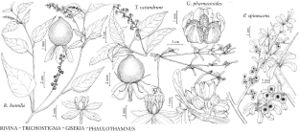Difference between revisions of "Rivina humilis"
Sp. Pl. 1: 121. 1753.
FNA>Volume Importer |
FNA>Volume Importer |
||
| Line 12: | Line 12: | ||
|name=Rivina laevis | |name=Rivina laevis | ||
|authority=Linnaeus | |authority=Linnaeus | ||
| + | |rank=species | ||
}} {{Treatment/ID/Synonym | }} {{Treatment/ID/Synonym | ||
|name=Rivina portulaccoides | |name=Rivina portulaccoides | ||
|authority=Nuttall | |authority=Nuttall | ||
| + | |rank=species | ||
}} | }} | ||
|hierarchy=Phytolaccaceae;Rivina;Rivina humilis | |hierarchy=Phytolaccaceae;Rivina;Rivina humilis | ||
| Line 40: | Line 42: | ||
-->{{#Taxon: | -->{{#Taxon: | ||
name=Rivina humilis | name=Rivina humilis | ||
| − | |||
|authority=Linnaeus | |authority=Linnaeus | ||
|rank=species | |rank=species | ||
| Line 55: | Line 56: | ||
|publication year=1753 | |publication year=1753 | ||
|special status= | |special status= | ||
| − | |source xml=https://jpend@bitbucket.org/aafc-mbb/fna-data-curation.git/src/ | + | |source xml=https://jpend@bitbucket.org/aafc-mbb/fna-data-curation.git/src/f50eec43f223ca0e34566be0b046453a0960e173/coarse_grained_fna_xml/V4/V4_16.xml |
|genus=Rivina | |genus=Rivina | ||
|species=Rivina humilis | |species=Rivina humilis | ||
Revision as of 21:38, 16 December 2019
Plants erect, straggling, or vinelike, 0.4–2 m, ± glabrous or densely pubescent. Leaves: petiole 1–11 cm; blade lanceolate, elliptic, or oblong to deltate or ovate, to 15 × 9 cm, base cuneate or rounded to truncate or cordate, apex acuminate or acute to obtuse or emarginate. Racemes 4–15 cm; peduncle 1–5 cm; pedicel 2–8 mm. Flowers: sepals white or green to pink or purplish, elliptic or oblong to oblanceolate or obovate, 1.5–3.5 mm; style often curved. Berries 2.5–5 mm diam. Seeds lenticular, 2–3 mm, enclosed in thin, densely pubescent membranes. 2n = 108.
Phenology: Flowering year-round.
Habitat: Woods, hammocks, thickets, shell ridges, roadsides, disturbed areas
Elevation: 0-1700 m
Distribution
Ariz., Ark., Fla., La., N.Mex., Okla., Tex., Mexico, West Indies, Central America, South America, Asia, Africa, Pacific Islands.
Discussion
During enlargement and maturation of the fruit of Rivina humilis, the two inner cell layers of the pericarp become separated from the outer layers. The cells of the outermost two layers elongate centrifugally, eventually forming tubular trichomes 133–229 µm long. These two layers become appressed and adherent to the seed coat; thus the seed appears to be, and is sometimes described as, pubescent (J. W. Thieret 1966b). The outer layers of the pericarp differentiate into the juicy portion of the fruit (L. B. Kajale 1954; D. D. Nautiyal and S. C. Gupta 1984).
Rivina humilis is cultivated as a greenhouse plant or, in warm areas, as a garden ornamental. With its colorful berries, it is more attractive in fruit than in flower.
Selected References
None.
